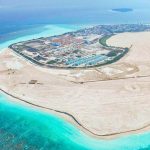
The Ministry of Finance’s latest Weekly Fiscal Developments report, published on 30 April 2025, reveals that the Maldives is in a fiscal surplus as of 24 April 2025, driven by strong revenue inflows, particularly from tourism-related taxes, paired with subdued capital spending. While this paints a picture of short-term stability, it also exposes persistent structural challenges in translating budget allocations into tangible development progress.
At MVR 12.4 billion, cumulative revenue and grants outpaced expenditure by nearly MVR 1.9 billion. This is a significant turnaround compared to the MVR 1.6 billion deficit recorded during the same period last year. However, the surplus has less to do with increased efficiency in public spending and more with delayed capital outlays. Recurrent expenditure remains steady, at MVR 9.7 billion, while capital expenditure is alarmingly low at just MVR 804.5 million, merely 6% of the approved capital budget of MVR 12.6 billion.
Tourism Goods and Services Tax alone contributed over MVR 3.8 billion, accounting for the most substantial increase in tax revenue. In contrast, grants plunged to MVR 76.3 million, significantly down from MVR 208.2 million at the same point in 2024, reflecting either delayed disbursement or a narrowing pipeline of donor support.
Meanwhile, infrastructure and development remain stalled. Spending under the Public Sector Investment Programme (PSIP) totalled only MVR 839.5 million, just 7% of the MVR 12.4 billion approved for the year. Key areas such as housing and land reclamation, environmental protection, and education have seen particularly slow disbursement, raising questions about procurement bottlenecks, implementation delays, or strategic prioritisation.
Some of the largest ministries in terms of allocated funds, including the Ministry of Construction, Housing and Infrastructure and the Ministry of Health, have used only MVR 550.7 million and MVR 402.3 million respectively, far below projected rates. In contrast, agencies with fixed cost structures like the National Social Protection Agency and Maldives Police Services show high utilisation, reflecting recurring commitments such as subsidies, Aasandha, and salaries.
Despite low capital spending, debt obligations continue to mount. Loan repayments reached MVR 2.5 billion, more than triple the amount repaid during the same period last year. Transfers to the Sovereign Development Fund also increased to MVR 561.7 million, possibly in preparation for upcoming external repayments or fiscal contingencies.
This lopsided performance, marked by strong revenue growth but weak development execution, may temporarily ease liquidity pressures but risks undermining long-term infrastructure goals and service delivery promises. If capital implementation continues to lag while recurrent obligations grow, the fiscal outlook could deteriorate in the latter half of the year, particularly as external debt repayments come due.
While a surplus is a positive signal on the surface, a deeper look suggests that the Maldivian government may be saving money by simply not spending it where it’s needed most.












